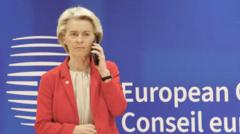The European Court has mandated the release of text messages between Ursula von der Leyen and Pfizer's CEO, highlighting issues of transparency and accountability in EU decision-making.
EU Court Overrules Commission on Von der Leyen-Pfizer Text Messages Release

EU Court Overrules Commission on Von der Leyen-Pfizer Text Messages Release
The decision emphasizes the importance of transparency in EU operations amid vaccine contract negotiations.
The European Union's top court has ruled against the European Commission's refusal to disclose text messages exchanged between Ursula von der Leyen, the Commission president, and Albert Bourla, the CEO of Pfizer, during crucial negotiations for Covid-19 vaccine contracts. The General Court asserted that the Commission failed to provide a valid justification for withholding these communications from public scrutiny, which were requested by an investigative journalist in 2021.
This pivotal case arose during a period when Pfizer secured multi-billion euro contracts with the EU, securing an additional 1.8 billion doses. The ongoing secrecy regarding these text exchanges, which has drawn the moniker "Pfizergate" in Brussels, raises questions about the transparency of government dealings during public health emergencies.
Transparency International lauded the ruling as a significant triumph for open government in the EU, advocating for change in the Commission's approach to information release. Von der Leyen's reputation could take a hit due to allegations of insufficient transparency regarding the vaccine negotiations, a responsibility she undertook upon becoming Commission president in 2019 and navigating the EU's response to the pandemic.
The controversy began in April 2021, following a report by New York Times journalist Matina Stevis that outlined von der Leyen's private negotiations with Bourla after BioNTech obtained regulatory approval for its Covid-19 vaccine. Investigative journalist Alexander Fanta subsequently filed a Freedom of Information request for the text messages exchanged between January 2021 and May 2022, only to be denied by the European Commission, which claimed no such documents existed.
The lack of clarity surrounding the handling of mobile text messages, often seen as unarchived or not considered public records, emerged as a key issue in the legal challenge. Fanta's complaint was escalated to the European Ombudsman, prompting a finding of maladministration on the part of the Commission.
Subsequent rulings confirmed that the EU executive had relied on vague or inconsistent claims rather than robust evidence in its defense. The court noted that the burden of proof lies with the Commission to demonstrate whether the documents in question had either been deleted or were never in its possession. The Commission has announced plans to review the ruling and assess the implications for its transparency practices.



















